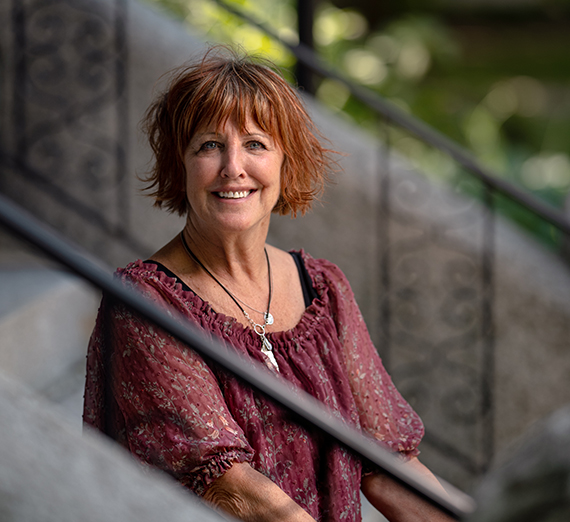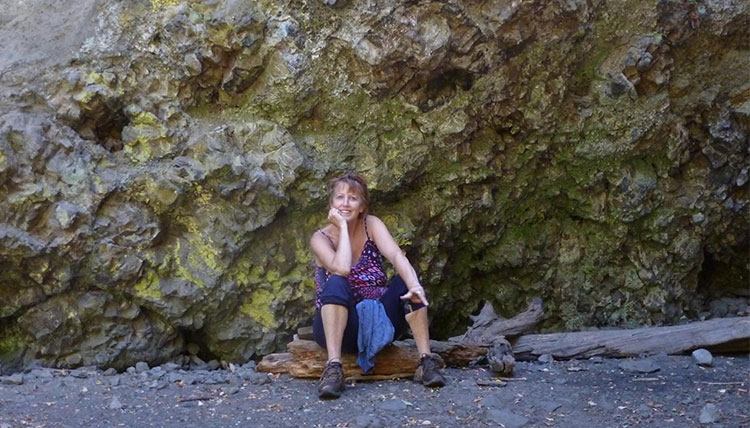A Playful, Restless Intellect

Mary Jeannot has always taught that any language, and communicating with speakers of other languages, is more than just the spoken or written word. It involves getting to know people.
Take, for example, this interaction:
“Yesterday we were buying two coffees at a stand in Akko, Israel,” Jeannot says. “Prices there are never fixed, and the man, who didn’t speak English, held up a two and a four. So, naturally, my husband thought the price was 24 shekels, but it was 42. The vendor was counting from right to left (Hebrew and Arabic), not left to right (English) ... It’s possible he was toying with us, too!”
Now bearing the title Associate Professor Emerita, Jeannot retired in May after a stellar 30-year teaching career at Gonzaga where she founded the master’s program in Teaching English to Speakers of Other Languages (1998), a work of love she describes as centered in context and ambiguity.
“When you find yourselves in the thick of cultural difference, it’s inevitably ambiguous. So, embrace it. Learn from it,” she says. “What you see on the surface is not always what is below it.”
Like knowing that people in Israel write and read right to left.
‘Between Making and Finding’
Jeannot, a survival learner of several languages, has worked in the Central African Republic, Ivory Coast, Micronesia, Hungary, Poland, Japan, Italy, Colombia, Benin, Zambia, Malawi, China, Cuba and Mexico. She loves the literacy challenges she has found in each locale.
“Mary is dynamic in the classroom,” says retired Assistant Professor Marilyn Jackson Runyan, who accompanied Jeannot early in her career. Runyan recalls a memorable class Jeannot taught, highlighting a short conversation in Sango, a central African language.
“She danced around the room, using hand gestures, drawing stick people on the whiteboard, speaking Sango but no English at all,” Runyan says, “almost magically drawing out of those initially nervous future teachers the words of a language they had never spoken, let alone heard of.”
Within half an hour the students were reciting the conversation without much hesitation.
Education Associate Professor James Hunter, who succeeded Jeannot as director of the TESOL program, adds “invention” to his definition of his predecessor.
“Invention is characterized as somewhere between making and finding, creation and discovery,” he says. “Mary has urged us all – faculty and students alike – to be co-inventors of our practice and our (academic) community. In this way, we are all mentors to each other, rather than separated into experts and novices, as one might expect in a typical graduate program.
“Mary encourages us to embrace ambiguity, rather than seek an elusive, even fictitious, exact meaning.”
Jeannot has always been the heart of this program, Hunter adds.
The affable Jeannot had a vision for, and a purpose to, her work. She also exhibited a playful persona.
Amber McKenzie, now assistant dean of Global Education and Strategic Partnerships at Community Colleges of Spokane, served as Jeannot’s right hand for 14 years.
“Mary was born to teach and innovate,” McKenzie says. “She is incapable of being boring. She is passionate about engaging her students in the most meaningful and transformational way, and she does this by pushing them (and herself) outside their comfort zones.”
Naomi Hagen attests to this.
“I was an MA/TESOL adviser, working on my practicum in Zambia,” Hagen shares. “I had worked previously with middle and high school students. My practicum assignment was working with 5th-8th graders. After the first day, Mary saw this was too comfortable for me. The next day I was working with another practicum teacher teaching adults. Still a day later, I was learning their native Bemba by day and training college students to teach others by night. Each time forcing me out of my comfort zone.
“Within a two-month span, Mary had pushed me into every different aspect that I would encounter in my career. I now have the career and the confidence I need,” says Hagen, a professional development coach in Spokane Public Schools where she trains teachers to work with multilingual students.
McKenzie will always look up to her mentor.
“What I love most about Mary is her ability to play, laugh and not take herself too seriously. She has the brain and the intellect of an academic, but the heart of a child, which is a rare and unique combination if you ask me,” McKenzie says. “She is whimsical, engaging, self-reflective and so much fun.
“She is also outrageous, in the best possible way, outspoken, and possesses a style of dress which sometimes includes wearing her shirts inside-out and backwards,” McKenzie adds with a smile.
In the Beginning
While a French major at Seattle University, she was part of the university’s travel abroad program in France. She joined the Peace Corps, working in the Central African Republic, and then completed graduate studies at University of Massachusetts, Amherst.
But she was homesick for the West Coast. She knew about Gonzaga as her older brother Tom teaches philosophy here. When she learned of an opening for an English as a Second Language position, she applied and was hired in 1992.
In 1998, she started the MA/TESOL program and played a significant role in merging the TESOL and English as a Second Language programs. That same year she created the free TESOL Summer Institute, which today draws upwards to 400 middle and high school immigrant and refugee students to campus to gain academic, linguistic, social and cultural enrichment from graduate students, GU faculty members and teachers in the community. Not only does the partnership with Spokane Public Schools benefit our youngsters, it also provides a great training ground for teachers to build their resumes and get substantial experience in international education.
Discovery Over Mastery
“Any account of Dr. Jeannot’s legacy also needs to include her longstanding and consistent efforts to bring Gonzaga’s domestic and international students into meaningful interaction with the larger world,” says Anny Case, chair of Teacher Education.
In 2009, for example, she launched the Peace Corps Masters International program, which prepared students for a master’s degree that included a Peace Corps assignment overseas.
She also helped initiate the Bachelor of Education degree in Community, Culture and Language in 2019, an interdisciplinary program where students gain deep understanding of the ways in which cultures, languages and literacies affect communities.
“With cultural humility, we can develop alongside individuals from diverse linguistic and cultural backgrounds,” Jeannot says.
Working with Hunter and John Eliason in the Writing Center, this threesome was able to hire a much-needed multilingual specialist in the Writing Center. Jeannot’s graduate students serve assistantships across campus, in business, English, law, modern languages, nursing and engineering, serving our international community.
“Dr. Jeannot’s influence on international education at Gonzaga is unsurpassed,” says Case.
“Mary understands firsthand how meaningful global relationships can challenge our unchecked thoughts, beliefs, biases and perceptions about the world and those in it, forcing growth and transformation in unexpected ways,” says McKenzie.
Former student Hagen talked about mastering a subject in a class with Jeannot, who responded: “Do you ever think anyone reaches mastery, where there is nowhere else to grow? No matter what you’ve learned so far, there is always more to learn,” Jeannot said. “Mastery is a swear word in my book.”
What’s Next
An enthusiastic traveler, a retired Jeannot would love to venture to Vietnam and Southeast Asia, when she is not reading, practicing yoga, hiking and taking steps to ask the universe “what’s next”? Husband Jeff Hazen, a chemistry and biochemistry instructor and stockroom assistant, does not want to pollute the world with jet fuel, so when he retires this couple plans to travel the U.S. in a small electric car, free and open to whatever the world has to offer.

